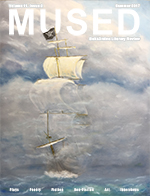Ramadan and Fasting
Manijeh Badiozamani
The long sleeve dress hides the black and blue marks on my upper arms. We are visiting Aunt Tooran at the Misaghieh Hospital. She has given birth to a little girl. Mother and I walk into the maternity ward. Aunt Tooran is in bed Ė she looks good. She is older than my mother by three years, but she married later and this is her first child.
Mother sits on a chair by the side of the bed and the two sisters start talking in hushed quiet voice. I stay standing near my mother. Mom recounts the events of the previous day, and then grabs one of my arms, pulls up the sleeve to show her sister the black and blue marks on my skinny arm inflicted by my fatherís angry hands the day before. Iím totally embarrassed.
It is the month of Ramadan in the Moslem world Ė a full month of fasting. In our household, the only folks who fast are Aziz, my fatherís aunt, and Homa, her teenage daughter. Those two are the devout souls who fast the entire month. No one else in my house fasts. Dad and her brother talk of their duodenal ulcers and say they cannot go without food for the whole day. Motherís fasting is sporadic; it depends on whether or not she needs to shed a few pounds.
What intrigues me about Ramadan is the ritual that Aziz and Homa follow during the entire month. They get up before the sunrise to prepare for the morning meal, Sahari. They start the Samovar to boil water for tea; they warm up the left-over meal from the night before, whatever it may be: rice, lamb stew with herbs, or cutlet. I love the staples at the Sahari: bread sprinkled with sesame seeds, a dish of walnut and raisins, and a chunk of feta cheese on the side. Iím eager to get up early and be part of this ritual. Also, Iím enchanted by the singing of the Muezzin whose voice I hear through a loudspeaker from the nearby mosque. The loudspeaker rotates, and I hear the voice of the Muezzin sometimes close by, or from afar. He sings the prayers from the Quoran, and in the quiet early morning hours it sounds like a voice from heaven.
Iím eleven years old and a skinny girl. My parents constantly give me vitamins and cod liver oil so that I may gain weight and get stronger. I hate cod liver oil. The sight of the bottle with its yellowish color and the fishy smell make me throw up. Iím in the habit of closing my eyes, pinching my nose between my thumb and index finger, opening my mouth so that mother could shove a spoonful of the oil into my mouth. They believe it will make me stronger and gain weight. Everyone thinks being skinny is bad.
It is fine with my parents if Iím only an observer of Aziz and Homaís ritual during Ramadan. The problem begins when a few of my classmates, including my best friend, Soraya, come to school and declare they are fasting. I want to fast too!
Aziz knows how my parents feel about this business of fasting. She makes sure to perform her morning ritual quietly so I donít wake up early in the morning. But my desire to fast just like my friends makes me wake myself up, and join Aziz and Homa. They have already finished their morning meal. Despite Azizís objection, I quickly drink a cup of tea and swallow a piece of bread and later declare to my parents that Iím fasting and refuse to eat breakfast.
By midday I refuse to eat lunch too. My parents show patience. They try to reason with me to break my fast, but I donít eat. My stubbornness exacerbates my father and puts him into a rage. He is so angry that he grabs me by both my arms, and in the heat of his anger sinks his fingers into my skinny arms, and gives me a good shake. I break my fast and eat.
Years pass by. I get older and stronger, and read articles about the actual health benefits of fasting that go beyond the religious implications: cleansing of the body and mind, abstaining from harmful habits such as smoking, experiencing hunger in order to have compassion for the poor and the hungry. But I never fast again! For me, Ramadan and fasting remain memories laced with fear, anger, sadness, and embarrassment.

